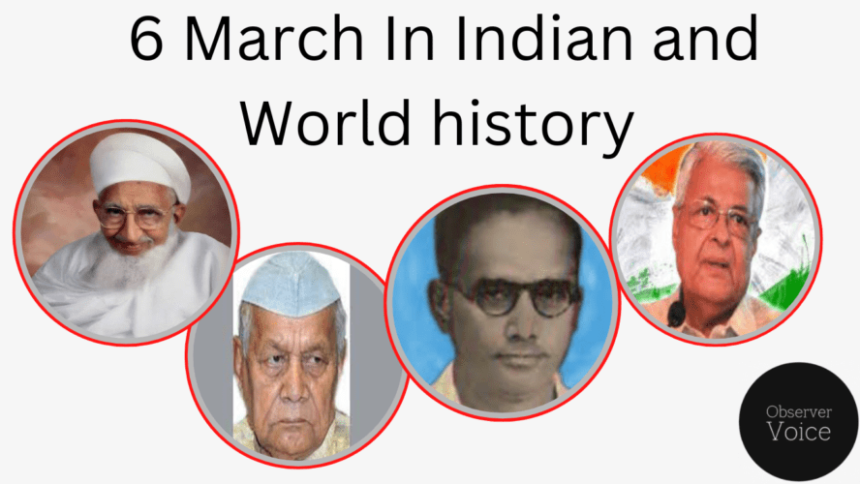6 March in Indian and World History is celebrated, observed, and remembered for various reasons. 6 March is the birth anniversary of Syed Ahmed, Pratap Bhanu Sharma, and Mohammed Burhanuddin.
6 March is also observed as the death anniversary of Ambika Chakrabarty, Ram Sundar Das, and Ramchandra Kashinath Mhalgi.
Birth Anniversary
6 March in Indian history is celebrated as the birth anniversary of the following personalities:
Syed Ahmed (6 March 1945 – 27 September 2015), an Indian politician, author, and a member of the Congress Party. He was sworn in as the Governor of Manipur on 16 May 2015 but only served four months before dying in office on 27 September. He was born on 6 March 1945 in Faizabad, British India.
Pratap Bhanu Sharma, an Indian politician and a senior leader of the Indian National Congress. He has been a member of the 7th and 8th Lok Sabha from Vidisha, Madhya Pradesh. He was born on 6 March 1947 in Vidisha, India.
Mohammed Burhanuddin (6 March 1915 – 17 January 2014, a Spiritual Leader and Philanthropist. He led the community for 49 years in a period of social, economic, and educational prosperity. Burhanuddin has presented the highest national civilian honors of the states of Egypt and Jordan. He was honored with Padma Shri, the fourth highest civilian award of India, in 2015. Burhanuddin was born on 6 March 1915 in Surat, India.
Read More: 5 March in Indian and World History
Death Anniversary
6 March in Indian history is remembered as the death anniversary of the following personalities:
Ambika Chakrabarty (January 1892 – 6 March 1962), an Indian independence movement activist and revolutionary. Later, he was a leader of the Communist Party of India and a member of the West Bengal Legislative Assembly. In 1930, he was injured in a gunfight with the British army but was able to escape. He joined the Communist Party of India. He died on 6 March 1962.
Ram Sundar Das (9 January 1921 – 6 March 2015), an Indian politician and 15th Chief Minister of Bihar. He was a two-time Member of Parliament from the Hajipur constituency. Das was born on 9 January 1921 into the Chamar caste, a scheduled caste. He played an active role in the 1942 Quit India Movement. Das served as a functionary in Congress Socialist Party in his native place Sonpur. In 1968, he was elected as a Member of Bihar’s legislative council and continued in this role until 1977. He died on 6 March 2015 in Patna, Bihar, at the age of 94.
Ramchandra Kashinath Mhalgi (9 July 1921 – 6 March 1982), commonly known as Rambhau Mhalgi, was an Indian politician and a member of the Lok Sabha. He earned LLB and MA, as well as cleared the bar council exam. He was regional secretary of the RSS in 1950-54. Mhalgi belonged to Bharatiya Janata Party. He died on 6 March 1982 at an age of 60.
Read More: 4 March in Indian and World History
Notable events on 6 March in Indian and World history
6 March 1869 – At a meeting of the Russian Chemical Society, Russian chemist Dmitri Mendeleev presented the first periodic table. he made a formal presentation to the Russian Chemical Society, titled The Dependence between the Properties of the Atomic Weights of the Elements, which described elements according to both atomic weight (now called relative atomic mass) and valence.
6 March 1888 –Louisa May Alcott stands as one of the most influential American authors, best known for her timeless novel “Little Women” – died
6 March 1915– Mahatma Gandhi met first time with Rabindranath Tagore in Shantiniketan.
6 March 1943 – The Battle of Medenine was fought in Tunisia between the Italian-German forces led by Erwin Rommel and Giovanni Messe and the British Eight Army led by Bernard Montgomery.
6 March 1943 – The Battle of Fardykambos, one of the first major battles between the Greek Resistance and the occupying Royal Italian Army, ends with the surrender of an entire Italian battalion.
6 March 1944 – Soviet Air Forces bomb an evacuated town of Narva in German-occupied Estonia, destroying the entire historical Swedish era.
6 March 1945 – Cologne is captured by American troops. On the same day, Operation Spring Awakening, the last major German offensive of the war, begins.
6 March 1946 – Ho Chi Minh signs an agreement with France which recognizes Vietnam as an autonomous state in the Indochinese Federation and the French Union.
6 March 1947 – Winston Churchill announced that he opposed British troop withdrawals from India.
6 March 1957 – Ghana became an independent nation from the control of UKGhana celebrates Independence Day on the same day.
6 March 1960 – Switzerland granted women the right to vote in municipal elections.
6 March 1964 – American boxer Cassius Clay took the name Muhammad Ali, which was given to him by his spiritual mentor, Elijah Muhammad, leader of the Nation of Islam.
March 6, 1967 – Zoltán Kodály a Hungarian composer, ethnomusicologist, music pedagogue, linguist, and philosopher, died.
6 March 1991 – Chandrasekhar, who was the Indian prime minister for seven months, resigned. His government could not introduce a full budget because on 6 March 1991 Congress withdrew support during its formulation. His tenure was the second shortest period after Chaudhari Charan Singh.

